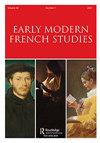介绍
IF 0.2
3区 历史学
Q2 HISTORY
引用次数: 0
摘要
迈克尔•莫里亚蒂(Michael Moriarty)是一位学者,他的六部主要专著加起来超过2000页,通过将一系列过于简短的文章献给他,似乎有违直觉。然而,也许我们可以从让·拉辛(Jean Racine)对赞美路易十四(praeteritio)的巧妙运用中得到启发。1678年10月30日,拉辛在法国学院(academie francaise)的第一次演讲中,面对赞美路易十四的任务,他宣称:“Qui pouvait miieux nous aider本文章由计算机程序翻译,如有差异,请以英文原文为准。
Introduction
It might seem counter-intuitive to honour Michael Moriarty, a scholar whose six major monographs add up to over 2000 pages of writing, by dedicating a series of all-too-brief essays to him. Yet, perhaps we can take inspiration from the skilful use of praeteritio used by Jean Racine, who, when faced with the task of praising Louis XIV during his first speech to the Académie française on 30 October 1678, declared: ‘Qui pouvait mieux nous aider à célébrer ce prodigieux nombre d’exploits dont la grandeur nous accable pour ainsi dire, et nous met dans l’impuissance de les exprimer ?’ So perhaps these short articles might indeed be the truest way of recognizing and paying respect to Moriarty’s prodigious and ground-breaking published output. Anybody who knows Michael Moriarty would of course recognize immediately the absurdity of comparing him to a vainglorious monarch, for he is a man of modesty, kindness and decency, someone who is far more likely to look forward to reading and learning from this collection of articles than to glory in the academic equivalent of a spotlight trained upon him. The frequency with which Moriarty’s scholarship plays a key role both in the articles that follow in this special number and in the work of so many researchers, graduates and undergraduates across the world testifies to the mark that he has left and continues to leave. From his seminal first book, Taste and Ideology in Seventeenth-Century France (Cambridge: Cambridge University Press, 1988), to his latest work, the monumental study Pascal: Reasoning and Belief (Oxford: Oxford University Press, 2020), Moriarty manages on the one hand to present his argument cogently and persuasively for readers who have yet to encounter early modern French thought and on the other to invite readers who think they have seen it all before to re-evaluate the writings of the period from exciting new angles. To take his study of Pascal as one example, he is not content simply to place Pascal’s thought within the context of the seventeenth century, but he wishes also to question and examine its validity for modern readers. As he writes in the opening pages,
求助全文
通过发布文献求助,成功后即可免费获取论文全文。
去求助
来源期刊

Early Modern French Studies
Multiple-
CiteScore
0.10
自引率
0.00%
发文量
14
期刊介绍:
Early Modern French Studies (formerly Seventeenth-Century French Studies) publishes high-quality, peer-reviewed, original articles in English and French on a broad range of literary, cultural, methodological, and theoretical topics relating to the study of early modern France. The journal has expanded its historical scope and now covers work on the sixteenth, seventeenth, and eighteenth centuries. Within this period of French literary and cultural history, the journal particularly welcomes work that relates to the term ''early modern'', as well as work that interrogates it. It continues to publish special issues devoted to particular topics (such as the highly successful 2014 special issue on the cultural history of fans) as well as individual submissions.
 求助内容:
求助内容: 应助结果提醒方式:
应助结果提醒方式:


